Diego Maradona dead: Argentine soccer star’s doctor investigated for involuntary manslaughter
Diego Maradona’s doctor is under investigation with police searching the home of his personal physician and probing the Argentina football legend’s death.
News
Don't miss out on the headlines from News. Followed categories will be added to My News.
Argentine police have raided the home of footballer Diego Maradona’s physician, Leopoldo Luque.
The doctor is being probed over fears of medical negligence with police treating the star footballer’s death as a possible homicide.
Police searched the home of the personal physician on Sunday, local time, and investigators are extending the inquiry to include all medical staff connected to the care of Maradona during his final days.
Maradona died of acute lung edema and chronic heart failure, according to a preliminary autopsy report.
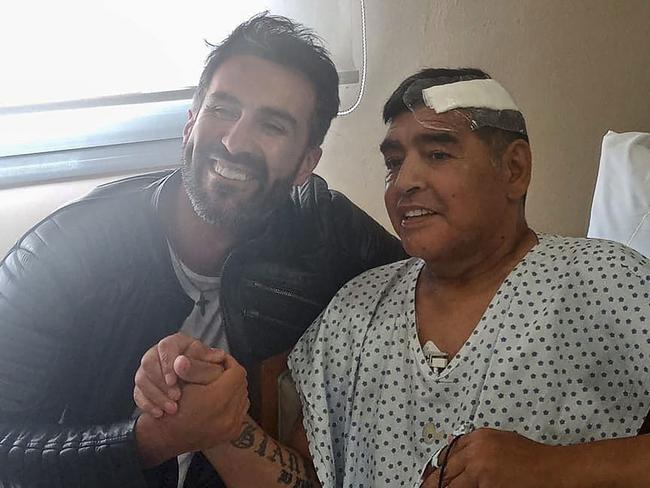
According to the Daily Mail, the search was ordered after Maradona’s daughters gave statements yesterday and questioned the medication their father was given.
It comes as Diego Maradona’s lawyer and agent, Matias Morla, wants an investigation into the time it took an ambulance to arrive at the soccer legend’s Buenos Aires home.
Maradona died on Wednesday after suffering a heart attack. He was just 60.
It comes as Maradona’s coffin was taken to the presidential palace in Buenos Aires for a period of lying in state, TV reports showed.
Six ambulances reportedly arrived to the Country Club San Andres, a private residential estate in the outskirts of Buenos Aires, where Maradona was living since leaving hospital two weeks ago following brain surgery, but attempts to revive him failed.
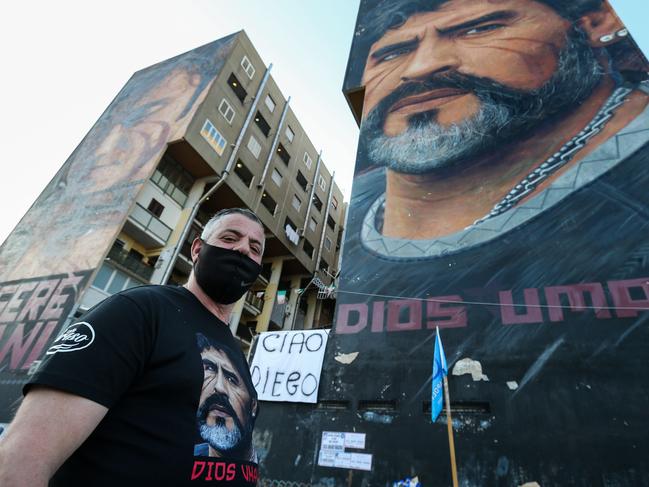
In a statement posted to social media, Mr Morla said that according to the report made by the San Isidro district attorney’s office, the ambulance took “more than half an hour” to arrive to the house, which he called “criminal idiocy” and called for action.
“This fact cannot be overlooked and I’m going to ask for an investigation to look into it until the end,” Mr Morla said.
“As Diego would say, you are my soldier, act with pity.”
It comes as thousands of Argentinians honoured Maradona on Thursday (local time) at a public memorial held at the Casa Rosada’s presidential palace in Buenos Aires.
Fences were put up along the major avenues in the vicinity of the Casa Rosada to prepare for the flood of visitors wanting to pay their respects to the former Barcelona, Boca Juniors and Napoli star.
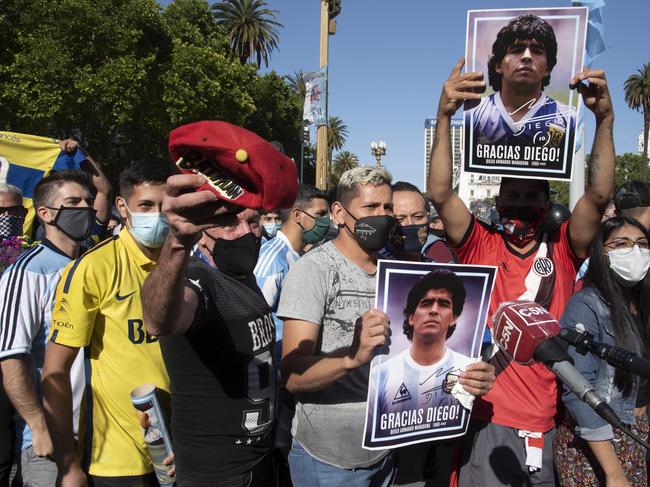

Maradona’s casket was covered with the country’s flag as well as Argentina and Boca guernseys.
“Today is a day of profound pain, sadness and reflection,” Mr Morla said. “I feel in my heart the departure of a friend, who I honoured with my loyalty and my accompaniment until his final days.”
The soccer legend will be buried on Thursday (local time) on the outskirts of Buenos Aires, a spokesman said.
Maradona will be laid to rest in the Jardin de Paz cemetery, where his parents were also buried, Sebastian Sanchi said.
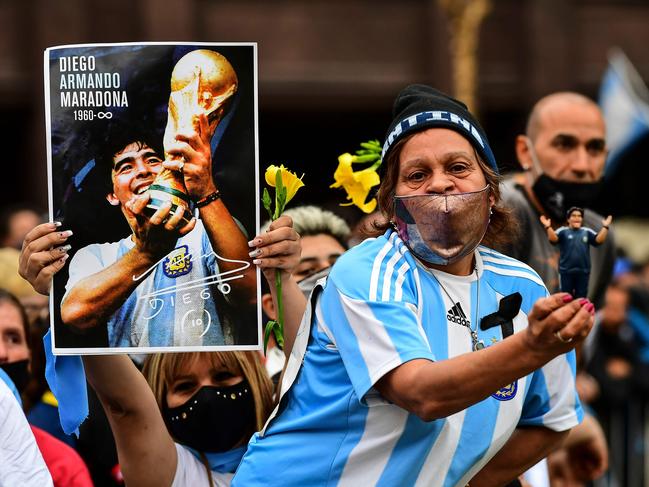
‘GREATEST EVER’: MARADONA MOURNED
Maradona was regarded as one of the finest players ever to grace the field. The Argentine World Cup-winning captain had undergone brain surgery this month and died of a heart attack, his lawyer and members of his entourage confirmed.
Maradona will be remembered for his “Hand of God” goal against England in the 1986 World Cup quarter-final in Mexico City, when he pushed the ball into the net.

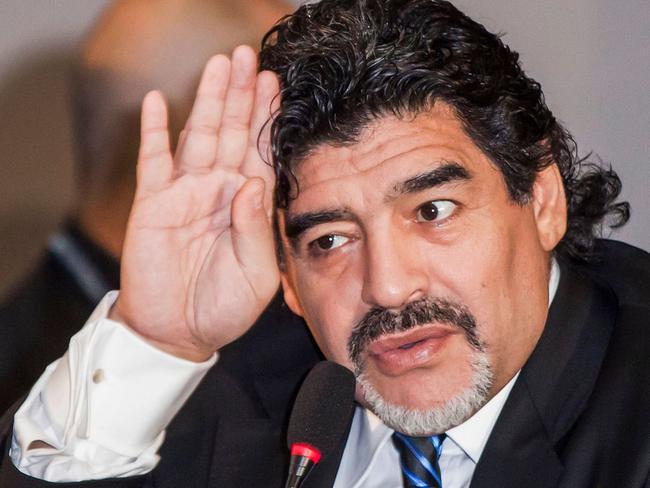

Minutes later he swerved through the helpless English defenders for a superb second goal, capping a victory that perfectly encapsulated the mixture of brilliant skill and often outrageous behaviour that ran through his life.
Maradona struggled with addiction to cocaine and alcohol and had been plagued by poor health in recent years.
Soccer legend Pele described Maradona as a “dear friend” and the 80-year-old Brazilian said he hoped they would “play together in the sky” one day.
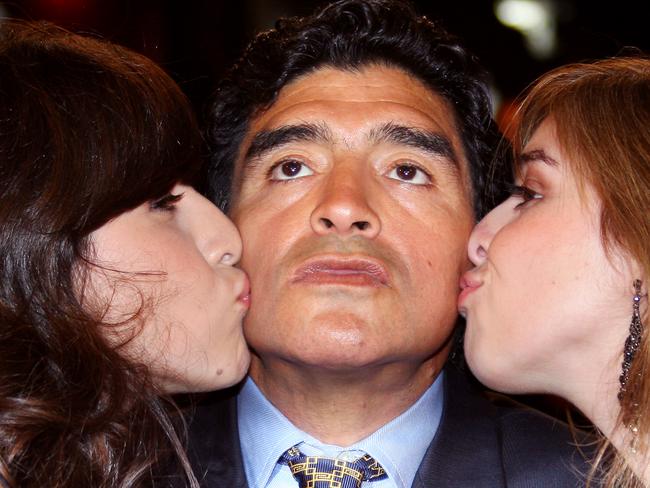
Gary Lineker, who was in the England team defeated in 1986, said Maradona was “arguably the greatest of all time” but referred to that infamous goal by tweeting: “After a blessed but troubled life, hopefully he’ll finally find some comfort in the hands of God. #RipDiego.” Lionel Messi led the tributes from modern-day players to his fellow Argentine, saying: “He has left us but he will never leave us because Diego is eternal.”
Argentine President Alberto Fernandez announced three days of national mourning in the South American country.
The Argentine Football Association paid tribute to Maradona with a statement on Twitter expressing “its deepest sorrow”.
“You will always be in our hearts,” a translation of the statement, which was written in Spanish, read.
La Asociación del Fútbol Argentino, a través de su Presidente Claudio Tapia, manifiesta su más profundo dolor por el fallecimiento de nuestra leyenda, Diego Armando Maradona.
— AFA (@afa) November 25, 2020
Siempre estarás en nuestros corazones 💙 pic.twitter.com/xh6DdfCFed
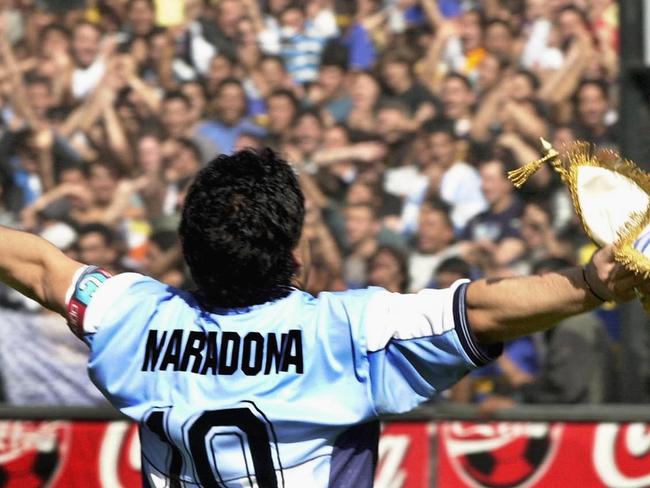
‘HUMAN OF GODS’
Stunned Argentines were plunged into grief by Maradona’s death, as he was remembered as a sublimely gifted sporting hero they saw as “the most human of Gods”.
The news fell like a hammer blow a nation beaten down by months of economic crisis and the health pandemic, but one where soccer is seen as a panacea for all ills.
Fans searching for a place to grieve gravitated towards the Obelisk landmark in the centre of Buenos Aires — and, of course, the Bombonera, the steep-sided cauldron of a stadium that is home to Boca Juniors, where Maradona’s genius was forged.
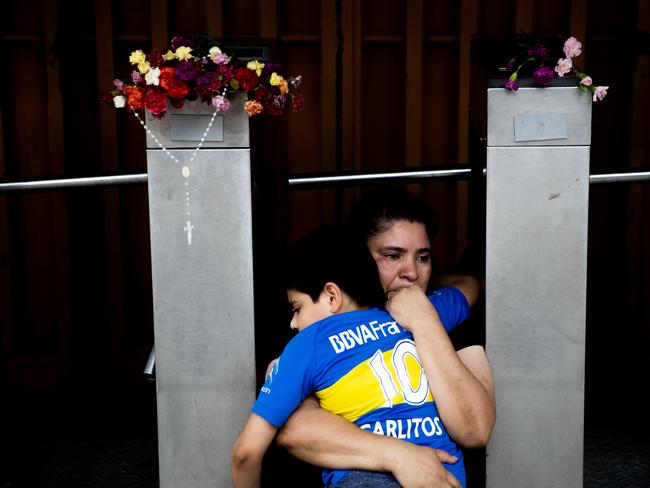
“I can’t believe it. It’s incredible. One thinks one gets through any storm, but no, everyone ends up being mortal. It feels like a bad dream. A joke,” Francisco Salaverry, 28, told AFP.
“Today’s a bad day. A very sad day for all Argentines,” President Alberto Fernandez summed up in an interview with sports channel TyC, after declaring three days of national mourning.
All around the city, the mourning had already begun as fans stood forlornly beside banners in homage to the Number 10, showing Maradona — who died aged 60 of a heart attack — in his dashing prime.
Many of the banners simply said D10S, a play on the Spanish word “dios” for “God” that includes Maradona’s jersey number.

TROUBLED GENIUS
Diego Armando Maradona Franco was born to a poor family and rose to become widely regarded as one of the greatest football players of all time.
He was one of the two joint winners of the FIFA Player of the 20th Century award.
Maradona’s decades-long career was elevated by his signature footwork and a left foot which could rarely be matched by any other player.
Maradona’s two goals in the 1986 FIFA World Cup quarterfinals helped advance Argentina to its second cup.


Tt was his controversial “Hand of God” goal, in which he simply and miraculously punched the ball into England’s net, catapulted him to legendary status in Argentina and into the hearts of soccer fans around the world.
Considered by sports media as a “classic number 10” Maradona enjoyed a long international career and became known for his speed, agility, dribbling skills, and deftness in close contact with opposing players.
His life was not without controversy, however.
From the mid-1980s until 2004, Maradona was reportedly addicted to cocaine, a drug he was thought to have begun using in Barcelona in the 1980s.
In his retirement he continued to top fans’ polls of soccer greats, received prestigious awards and published his autobiography, which became a bestseller.



